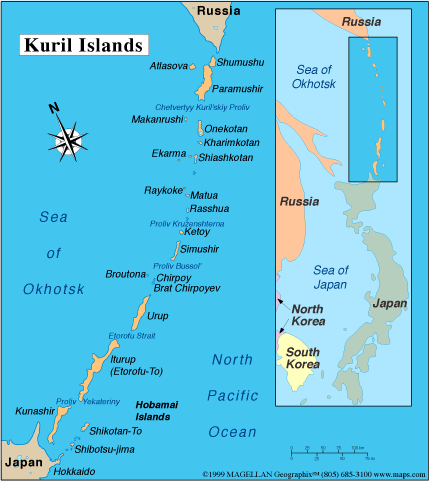The Kuril Islands, located in the Pacific Ocean, have long been a subject of territorial dispute between Russia and Japan. The conflict, often referred to as the Kuril Islands Conflict or the Northern Territories Dispute, has its roots in history and continues to shape the geopolitical dynamics of the region. This article aims to provide an overview of the Kuril Islands Conflict, exploring its historical background, key events, and the ongoing efforts to resolve the dispute.
Historical Background: The Kuril Islands, a chain of volcanic islands stretching from Hokkaido, Japan, to the Kamchatka Peninsula, Russia, have been inhabited by the indigenous Ainu people for centuries. In 1855, the Treaty of Shimoda was signed between Russia and Japan, granting Russia sovereignty over the southernmost Kuril Islands while recognizing Japan’s control over the northern territories. However, the shifting political landscape following World War II would significantly impact the status of these islands.
Post-World War II: The Kuril Islands Conflict escalated after World War II when the Soviet Union seized control of all the Kuril Islands. The San Francisco Peace Treaty of 1951, signed by Japan and several Allied powers, did not explicitly address the status of the Kuril Islands, leaving the dispute unresolved. Japan claims that the islands seized by the Soviet Union are part of its inherent territory, while Russia maintains its sovereignty over the islands based on historical and legal grounds.
Key Events: Several key events have shaped the dynamics of the Kuril Islands Conflict. In 1956, Japan and the Soviet Union signed the Joint Declaration, which aimed to normalize bilateral relations and stated that the Soviet Union would consider transferring two of the disputed islands to Japan after the signing of a peace treaty. However, the peace treaty was never concluded, and the islands remained under Russian control.
Efforts for Resolution: Efforts to resolve the Kuril Islands Conflict have been ongoing for decades. Numerous bilateral negotiations have taken place between Japan and Russia, but a mutually agreeable solution has remained elusive. Both countries have recognized the importance of maintaining dialogue and economic cooperation while acknowledging their differing perspectives on the sovereignty issue.
Regional Significance: The Kuril Islands hold significant economic and strategic value for both Japan and Russia. The region is rich in natural resources, including fish stocks and potential hydrocarbon reserves. Additionally, the islands’ proximity to important sea routes adds to their geopolitical importance, particularly in terms of maritime security and territorial claims.
International Repercussions: The Kuril Islands Conflict has not only impacted Russo-Japanese relations but has also attracted international attention. The United States and other countries have periodically expressed support for Japan’s claims and encouraged peaceful negotiations. The dispute serves as a reminder of the broader territorial disputes that continue to shape international relations in the Asia-Pacific region.
Conclusion: The Kuril Islands Conflict remains an unresolved territorial dispute between Russia and Japan. Despite numerous efforts, a mutually acceptable resolution has yet to be reached. The dispute’s historical background, key events, and regional significance demonstrate its complexity and the challenges involved in finding a lasting solution. As the two countries continue their dialogue and pursue diplomatic avenues, the future of the Kuril Islands remains uncertain, and the dispute’s impact on regional dynamics persists.



















Add Comment